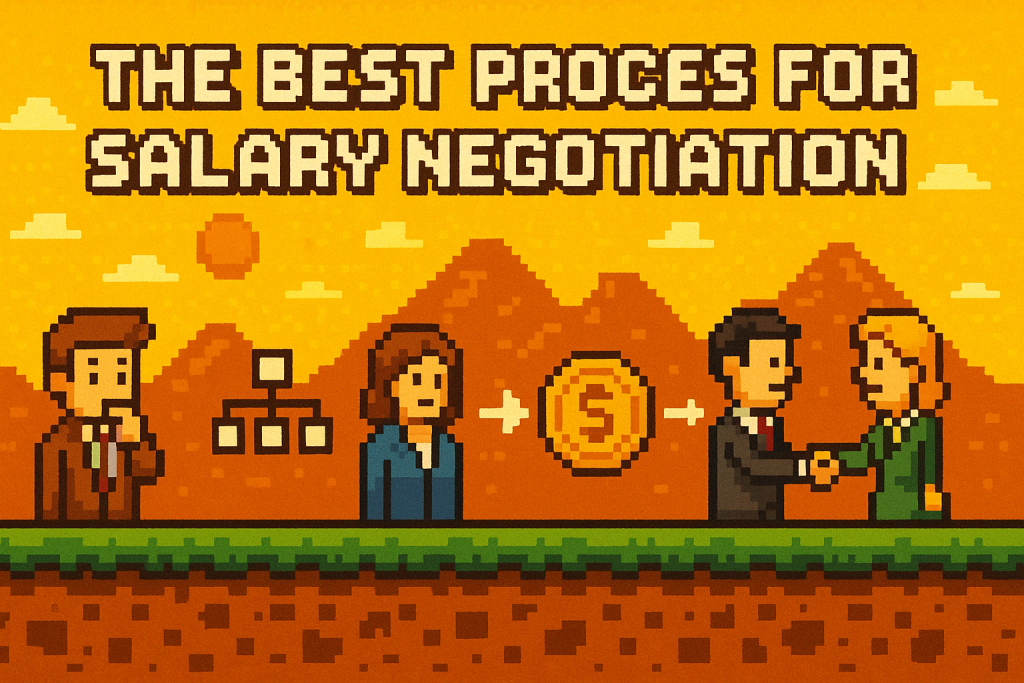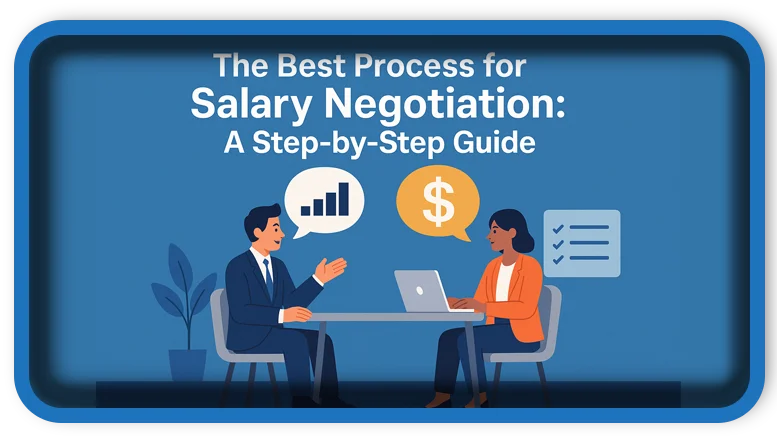⏲️ Estimated reading time: 5 min
The Best Process for Salary Negotiation: A Step-by-Step Guide. Learn the best process for salary negotiation with this step-by-step guide. Improve your confidence, communication skills, and chances of securing the compensation you deserve.
Salary Negotiation
Negotiating your salary can be intimidating, but it’s a critical skill that can significantly impact your career earnings and job satisfaction. Whether you’re negotiating a starting salary or asking for a raise, knowing the right process can give you the confidence and tools you need to succeed. In this comprehensive guide, we’ll break down the steps of salary negotiation so you can navigate the conversation like a pro.

Step 1: Do Your Research
Before any salary discussion, you must be well-informed. Research is your foundation.
Understand the Market Rate
Use websites like Glassdoor, Payscale, and LinkedIn Salary Insights to get a sense of the typical salary range for your role, industry, and location.
Consider Your Value
Evaluate your education, experience, unique skills, certifications, and achievements. How do you stand out from other candidates?
Know the Company
Research the company’s size, profitability, and compensation trends. A startup may offer equity over salary, while a large firm may have structured pay scales.
Step 2: Determine Your Ideal Salary Range
Use your research to establish three key numbers:
- Your ideal salary: The top of your range, based on your worth.
- Your acceptable minimum: The lowest you would accept without regret.
- Your walk-away point: If an offer is below this, be ready to decline.
Having a range gives you flexibility and helps you avoid being caught off guard.
Step 3: Time It Right
Timing is critical in salary negotiations.
During a Job Offer
Wait until the employer brings up compensation. If asked early, you can respond with, “I’d prefer to understand more about the role before discussing salary.”
During Employment
The best times to bring up a raise include annual reviews, after major accomplishments, or when taking on new responsibilities.

Step 4: Practice Your Pitch
Prepare a confident, concise script to make your case.
Key Elements to Include:
- Your enthusiasm for the role or company
- Evidence of your value and achievements
- Market data supporting your ask
- Your desired salary or range
Example:
“I’m really excited about the opportunity to join your team. Based on my experience managing high-profile projects and industry standards, I believe a salary of $80,000 reflects the value I bring.”
Practice with a friend or coach to get feedback and boost your confidence.
Step 5: Initiate the Conversation
When you’re ready, set up a dedicated time to talk whether in person, over the phone, or via video.
Tips for Initiation:
- Be professional and polite
- Show appreciation for the offer or role
- Be direct but not aggressive
Start the conversation with something like: “I appreciate the offer and am excited about the opportunity. I’d love to discuss the compensation package and ensure it reflects the value I bring.”
Step 6: Handle Counteroffers Gracefully
Employers may not immediately meet your request, but they may provide a counteroffer.
Evaluate the Full Package
Don’t focus solely on salary. Consider:
- Bonuses
- Equity
- Health benefits
- Remote work
- Vacation time
Respond Professionally
You can say: “Thank you for the counteroffer. I’d like to take some time to review it and will get back to you soon.”
This shows you’re thoughtful and serious.
Step 7: Make Your Decision
Weigh all components of the offer and how they align with your goals and needs.
Ask Yourself:
- Does the compensation meet my minimum?
- Am I excited about the role and company?
- Is there room for future growth and raises?
Trust your instincts. If you feel undervalued, it’s okay to walk away.
Step 8: Get Everything in Writing
Once you agree on a number, ask for the final offer in writing.
Make sure it includes:
- Base salary
- Bonuses or incentives
- Start date
- Any verbal agreements made
Having it all documented avoids future confusion.
Step 9: Follow Up With Gratitude
Regardless of the outcome, express gratitude.
Say Thank You
Send a polite thank-you email or message. It keeps the relationship positive and leaves the door open for future opportunities.
Bonus Tips for Salary Negotiation Success
- Stay positive: Focus on collaboration, not confrontation.
- Be ready to walk away: Confidence shows you know your value.
- Don’t rush: Take time to evaluate offers thoughtfully.
- Keep learning: Read books, take courses, or join negotiation workshops.
Conclusion
Mastering the salary negotiation process takes preparation and practice, but the payoff is well worth it. By following these steps from research to final decision you’ll approach your next negotiation with clarity and confidence. Remember, asking for what you’re worth isn’t just a smart career move it’s a reflection of self-respect and professionalism.
🏷️ Tags: salary negotiation, job offer tips, how to ask for a raise, career advice, job hunting, salary research, workplace communication, employee benefits, HR negotiation, professional development
Only logged-in users can submit reports.
Discover more from HelpZone
Subscribe to get the latest posts sent to your email.

